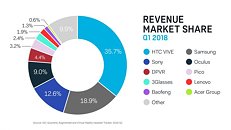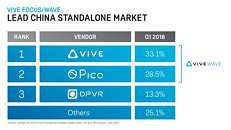Friday, July 27th 2018
Think VR Is Dying? It's Just Getting Started, Says HTC
Have you heard the news? Analyst reports are in and apparently, it's curtains for Virtual Reality (VR). Pardon us if we're not heeding the alarms. News of the so-called death of VR comes once a year and is greatly exaggerated.
That's not to say analyst VR forecasts don't have valuable information-they most certainly do. But we thought it would be helpful to look more closely and critically about how they came to their conclusions.Four Things You Should Know About the Analyst Forecasts
1) The start of "consumer VR" was driven primarily by mobile phone viewers like GearVR and Google Cardboard. As these have become less enticing (i.e. the VR experience isn't living up to consumer expectations), those units that were largely used as promotional devices for phone launches have dropped off.
2) Premium VR has solidified and ramped up over time, yet the major players have not released sales figures to substantiate the market momentum (read on for a key figure we are releasing today).
3) The overall VR experience continues to improve with the enhanced resolution and comfort of the HTC VIVE Pro, more titles, more accessories, and soon, less cables. Yet, the analysts aren't predicting a watershed moment based on these improvements.
4) Businesses are ramping up VR investment in a big way, especially in the location-based entertainment and training industries. These numbers don't hit consumer forecasts, and therefore, are not included in the reports.
What About Those VR Sales Numbers?
Ah yes, sales. Digital Trends wrote a report last week which dove into third-party Amazon data to show a steep drop in VIVE sales. This has been the case of most of the dread and panic pervading the internet about VR.
It's also not the whole story. There's a reason for this decline.
VIVE has paced at its highest sales velocity of all time, for weeks on end, and we sold out. For a consumer electronic product in its third calendar year, this continued trajectory is nearly unheard of.
Don't worry, though: we are ramping up production of the original VIVE and units will continue to roll out to online and retail over the coming weeks.
Reminder: These Things Take Time
More and more, as people begin to understand the possibilities for virtual applications, word of mouth will grow, and sales will continue their upward trajectory.
In the VR industry, it's important to not only move units, but to ensure that we have a growth path for customers and our business over time.
That is why we're happy to see intelligence firms like International Data Corporation (IDC) get it right. They analyzed VR revenue share and show VIVE as the leader in the space, which means our investments are paying off for consumers and businesses. It means customers have more to do with their VR headsets and it means businesses see a path toward earning money themselves. It's exactly where we want to be.We believe VIVE offers the best in premium VR, whether PC-based or Stand-alone (AIOs).
Our stand-alone product, VIVE Focus, is gaining traction rapidly since its China launch. It's the number one stand-alone in China, and our WaveVR platform runs on three of the top four AIOs in China. We'll have much more on Focus soon as we bring that product to additional markets.
Source:
VIVE Blog
That's not to say analyst VR forecasts don't have valuable information-they most certainly do. But we thought it would be helpful to look more closely and critically about how they came to their conclusions.Four Things You Should Know About the Analyst Forecasts
1) The start of "consumer VR" was driven primarily by mobile phone viewers like GearVR and Google Cardboard. As these have become less enticing (i.e. the VR experience isn't living up to consumer expectations), those units that were largely used as promotional devices for phone launches have dropped off.
2) Premium VR has solidified and ramped up over time, yet the major players have not released sales figures to substantiate the market momentum (read on for a key figure we are releasing today).
3) The overall VR experience continues to improve with the enhanced resolution and comfort of the HTC VIVE Pro, more titles, more accessories, and soon, less cables. Yet, the analysts aren't predicting a watershed moment based on these improvements.
4) Businesses are ramping up VR investment in a big way, especially in the location-based entertainment and training industries. These numbers don't hit consumer forecasts, and therefore, are not included in the reports.
What About Those VR Sales Numbers?
Ah yes, sales. Digital Trends wrote a report last week which dove into third-party Amazon data to show a steep drop in VIVE sales. This has been the case of most of the dread and panic pervading the internet about VR.
It's also not the whole story. There's a reason for this decline.
VIVE has paced at its highest sales velocity of all time, for weeks on end, and we sold out. For a consumer electronic product in its third calendar year, this continued trajectory is nearly unheard of.
Don't worry, though: we are ramping up production of the original VIVE and units will continue to roll out to online and retail over the coming weeks.
Reminder: These Things Take Time
More and more, as people begin to understand the possibilities for virtual applications, word of mouth will grow, and sales will continue their upward trajectory.
In the VR industry, it's important to not only move units, but to ensure that we have a growth path for customers and our business over time.
That is why we're happy to see intelligence firms like International Data Corporation (IDC) get it right. They analyzed VR revenue share and show VIVE as the leader in the space, which means our investments are paying off for consumers and businesses. It means customers have more to do with their VR headsets and it means businesses see a path toward earning money themselves. It's exactly where we want to be.We believe VIVE offers the best in premium VR, whether PC-based or Stand-alone (AIOs).
Our stand-alone product, VIVE Focus, is gaining traction rapidly since its China launch. It's the number one stand-alone in China, and our WaveVR platform runs on three of the top four AIOs in China. We'll have much more on Focus soon as we bring that product to additional markets.



87 Comments on Think VR Is Dying? It's Just Getting Started, Says HTC
Because we humans can't deal with it proper. Look at how smartphones and social media consume people today and how it is changing the world for us all. We are not becoming any more social because of it, on the contrary. Trolling is a 'thing' nowadays, it used to be a niche. Even our GOVERNMENTS, our leadership, that is supposed to provide vision and guidance, is consumed by it, or abusing it to further their own goals. And they do not align with what's best for us, not in the slightest.
VR is an alternate reality and it is one that completely consumes your attention. Look at how gaming has already changed: couch gaming with friends in splitscreen has pretty much died in favor of online gaming. Is online gaming objectively more fun? I don't think so, even if you play with those very same friends you played with right next to you. But it is easier. You just login, and boom, people to play with. It similar to shopping online. We're just lazy.
VR is another step in the wrong direction in that regard. Its more immersion at the cost of still experiencing a real life social aspect. When you step into that world, nothing else exists for you. And people can't handle that. Today's VR has too many shortcomings to really immerse but when it does, that's when it becomes all the more dangerous. We are adding a layer of abstraction to all of our interactions and we use it as a mask to hide behind. A customizable identity to 'live'. Its safe, and it allows people to cross boundaries they would never cross in real life. Because in real life, you'd get stomped in the face for most of it. This abstraction also removes the need for people to 'get over themselves', to take a difficult step towards socializing or adapting to society and reality. It allows them to live their sheltered lives, and it only promotes further manipulation by the powers that be. People get caught in very small, narrow worlds. Its the polar opposite of what we 'think' the internet does for us in terms of opening doors. It does, but only when used in moderation.
Internet has been around for decades now and people still haven't really learned how to deal with it. Only recently have we started discussing what to do with 'data'. And what we see is what we experience every day: there are other factors in play besides our mental and physical wellbeing that overrule the ideals we strive towards. Factors like money. Power. Influence. And social media, our data are tools used to impose things upon us. In the meantime, people live the illusion of choice and control when in fact they are being pushed in a direction they really don't want to go.
VR is simply the next step in that movement and until we can turn the general balance of power around, its a bad direction to go into. That does not mean its only a bad thing, it still is really cool tech. But that is the way of many new technologies: there are great potential advantages, but there are also major caveats that we are keen to ignore and prefer not to talk about, a taboo of sorts. Until that taboo is gone, we can't handle VR. Look how long it took for the penny to drop with regards to social media (and most people STILL don't get it...).
Fad (at least in this context) refers to people periodically getting a taste of a given technology. That, in itself, proves there's genuine interest in the tech. Yet, this tech isn't mainstream. It's underdeveloped and marketed with the hope money from early adopters will help iron out the remaining quirks. These fads are not attempts to scam anyone. If anything, pioneering companies lose money on these products in their bid to grab market share. However, since these things are not Tamagotchis, but rather expensive pieces of hardware, it's important to be aware that you're more of a venture capitalist when you dive int these. If you have the cash to spare, the curiosity and/or the will to support something new, then great. However, if your budget is more down to earth, a little due diligence will be in order.
I like the way computers are now. I have no need to shift paradigms...which in all practicality, are shittier.
I didn't think about any of that before, but you do bring up interesting points. As someone who just got a smartphone (simply because my dad passed away and my mom wanted to keep the number) and someone who hasn't logged into facebook in 10 years, I hear you about technology ruining our social lives. I'm already adamantly against it's invasiveness.. despite being enthusiast who likes wasting his time on geeky stuff like this site. :p It's kind of a love/hate thing, I guess. I said somewhere recently in another thread that I view computers as something I control. Not something I interact with or overpowers me. But purely control. I suppose that even applies to some of these new game interfaces, that try to overwhelm and blue the line between the digital and my real senses.
People are strange.
For me, I'm simply resistant to these big interface changes.. Especially changing a current solution that already works well for me. I particular hate all of the recent attempts to innovate beyond GUIs and typical control schemes (be it mice, keyboards, or gamepads). I can use all of these comfortably in multiple positions.. be it sitting, reclining, etc.. and can program each to carry out a lot of tasks with ease. Why would I want to change this to something more constraining? Secondly, big interface "improvements" just resulted in years of wasted resources and almost killed a whole platform (Xbox One), along with the tablet craze that killed a whole generation of Windows development (Windows 8).
I'm not sure who to blame more. The companies trying to sell the stuff.. Or the nerds who just wank off to technology for the sake of it. Either way, they're both cramping my style. If they'd both be happy with the limited applications their tech can be used in, I'd shut up. But no, they eventually want it to be everywhere.
Same goes for all of the voice assistants and Alexa commercials everywhere. I'm fine dialing numbers on my phone. I'm fine searching on my own. I'm fine clicking buttons on my own. Ugh.. I can't even stand auto-fillers half of the time. All of these supposed improvements are just slowing me down, and more nagging and annoying if anything. And as far as VR goes, just clumsy. /rant off :p
One thing that people don't generally know about VR is that it is very social compared to for example PC gaming. My usual gaming evening goes in the following fashion: I switch off all the lights and appliances, put the HMD on and appear to my friend's VR-home. He is already there, oh, the other guys are there too. I can see them, they can see me, we can speak, make gestures and stuff like that. And what makes it magical, is that it really feels like they are there. You feel their presence just as you do when someone is standing next to you in real life. Sure, you can't punch their real teeth out, but for me that's a plus :)
Anyways, we discuss about something and then we decide what to play. This evening we played Payday 2 VR for a few hours. After that I'm usually so tired that it is off to shower and sleep.
Without VR I would have been playing silently some FPS for the entire evening and perhaps the night too. No exercise and no real connections other than chat and VoIP. Sounds probably familiar to many.
What if you don't have VR-friends then? No problem. Many of the most popular games are very social too. For example in Echo VR you start from a lobby where you can already see players around the world. And once you get into a match, you are often "required" to communicate with your teammates. Sure, you don't really have to, but many do. I mean, if in CS:GO you hear 1% speaking through VoIP, in VR it is 99%. While in game, you see people giving high fives and shaking hands. It's pretty bizarre the 1st time.
I hope this helps to clear some misconceptions.
Also, things like this is why I do want to buy VR someday in future:
I could go on, but at some point we all overlap with various incarnations of VR and meet up at 'now'. So, is it dying? Naw... Frankenstein's monster was made in a day, but with lightning and an assistant. Also, the results didn't score highly with any peasant group polled. Sometimes its best to start slow, and just add an ass to a monkey. And that's how it's been, an ass here, an ass there -- over the last 2 decades.
But some are asking, what the hell good are these multi-assed monkeys we have today?! You nerds are just wankin' to your high ass-to-monkey ratios! No one is wrong here, it's just an indicator of the state of things. The nerds still need to iterate a few more cycles until VR evolves into something that is neither a monkey, nor have more ass than necessary. It'll happen at some point. Whether HTC going in for the long haul helps this along or not, we'll see.
edit: All of those improvements could have been done after 7, btw.. without causing so much confusion among both developers and users with the interface and API changes. If they had just put "classic" Windows applications at the forefront, we simply would have gotten where we are now at 10. That's what I call a waste of time. And to this day, they never had many adopters. We didn't see any big third party apps transition to the App Store look and feel. Not even Microsoft truly transitioned themselves. Office mostly remained a classic program. But you were never going to see the likes of Adobe or whoever doing it.
Only problem with RGB to me is that once you take the dive, you'll feel compelled to make more components with lights just to match the first. It's not worth it, unless you're building a whole machine from scratch. Case in point: I have a new Corsair AIO with lighting.. but now suddenly I feel compelled to get new memory sticks to match it.. which would blow a huge hole in my wallet. Best to just turn it off.
As we're speaking though, I'm typing this from my bed.. barely just woken up.. on my TV with a wireless keyboard. This should indicate how casual I am with games. I have a monitor too when I feel like it, but I'll game in this position most of the time. It's a LAZY hobby to me. Not some busy activity, like I once used to do at Arcades (that's where VR could shine, if anything).